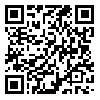Volume 21, Issue 4 (12-2022)
TB 2022, 21(4): 40-48 |
Back to browse issues page
Download citation:
BibTeX | RIS | EndNote | Medlars | ProCite | Reference Manager | RefWorks
Send citation to:



BibTeX | RIS | EndNote | Medlars | ProCite | Reference Manager | RefWorks
Send citation to:
Basereh M, Halvani G H, Fallah H, Jam bar sang S. Evaluation of the Rate of Smart Phone Addiction among Students in Shahid Sadoughi School of Health in Yazd during COVID-19 Pandemic. TB 2022; 21 (4) :40-48
URL: http://tbj.ssu.ac.ir/article-1-3334-en.html
URL: http://tbj.ssu.ac.ir/article-1-3334-en.html
Shahid Sadoughi University of Medical Sciences , masoud.basereh@yahoo.com
Abstract: (1782 Views)
Introduction: Smartphones have become an integral part of today's life. In addition to their benefits, excessive use of smartphones has negative effects, especially among students. One of these negative effects is smartphone addiction. During the Coronavirus pandemic and home quarantine, they were used to participate in virtual classes. They were also a means of entertainment and leisure. The aim of this study is to investigate the extent of smartphone addiction among students of Shahid Sadoughi School of Health in Yazd during the Coronavirus pandemic.
Methods: This was a cross-sectional descriptive study conducted during COVID-19 pandemic. The statistical population included 303 students from the school of Health. The instrument used was a cell phone addiction questionnaire. Data were analyzed by SPSS_26 software, independent t-test and Chi-square.
Result: The mean score for cell phone addiction was 39.6. 7.6% had mild addiction, 85.8%, moderate addiction, and 6.6% had severe addiction. No significant relationship was found between gender, marital status, and education level and smartphone addiction. 66% of students' time was spent on social networks.
Conclusion: Smartphone addiction is high among health school students. It is necessary to carry out serious educational interventions and cultural and extracurricular activities later in the post-COVID period.
Methods: This was a cross-sectional descriptive study conducted during COVID-19 pandemic. The statistical population included 303 students from the school of Health. The instrument used was a cell phone addiction questionnaire. Data were analyzed by SPSS_26 software, independent t-test and Chi-square.
Result: The mean score for cell phone addiction was 39.6. 7.6% had mild addiction, 85.8%, moderate addiction, and 6.6% had severe addiction. No significant relationship was found between gender, marital status, and education level and smartphone addiction. 66% of students' time was spent on social networks.
Conclusion: Smartphone addiction is high among health school students. It is necessary to carry out serious educational interventions and cultural and extracurricular activities later in the post-COVID period.
Type of Study: Research |
Subject:
Special
Received: 2022/04/24 | Accepted: 2022/07/16 | Published: 2022/12/1
Received: 2022/04/24 | Accepted: 2022/07/16 | Published: 2022/12/1
Send email to the article author
| Rights and permissions | |
 |
This work is licensed under a Creative Commons Attribution-NonCommercial 4.0 International License. |







